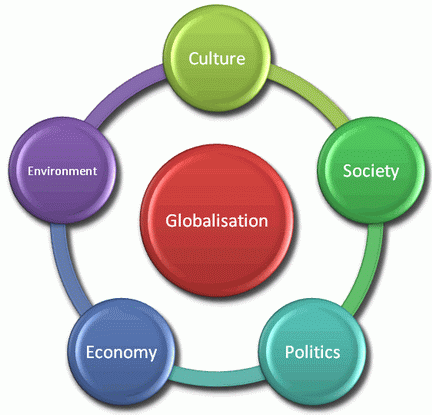Globalization is a multifaceted phenomenon that has increasingly permeated 21st-century discourse, influencing economies, cultures, and ecological systems alike. Defined broadly, globalization refers to the process through which goods, services, information, and culture transcend national boundaries, fostering interconnectedness and interdependence on a global scale. While this transformation has engendered a plethora of opportunities, it has also raised critical questions about its implications for sustainability and the environment.
At the heart of globalization lies the promise of enhanced economic growth. Nations have the opportunity to engage in trade, exchanging resources and innovations that contribute to their development. Proponents argue that accessing larger markets can lead to economies of scale, lowering costs and prices for consumers. However, this economic growth often comes at an ecological price, as increased production and consumption multiply carbon footprints and deplete natural resources. The tug-of-war between economic gain and environmental stewardship prompts an essential inquiry: Can globalization reconcile the dichotomy of economic expansion with sustainability?
Culture, too, undergoes a profound transformation under the auspices of globalization. The dissemination of ideas and cultural practices occurs with unprecedented velocity. From music and art to culinary traditions, this cultural exchange enriches societies, offering a mosaic of experiences and insights. However, the syndrome of cultural homogenization poses a significant threat. Unique traditions and practices may vanish, overshadowed by dominant global narratives. This reality compels a deeper examination: does globalization cultivate vibrant multiculturalism, or does it lead to the erosion of cultural identities?
One of the most salient aspects of globalization is the acceleration of technological innovation. Advances in communication and transportation technologies have made global interaction instantaneous. These developments create opportunities for collaboration across borders, encouraging knowledge sharing and fostering innovative solutions. For instance, global movements championing climate action harness social media to mobilize individuals, transcending geographical barriers. Yet, this reliance on technology also engenders questions about data privacy and corporate control. As technology weaves itself deeper into the fabric of our lives, the pursuit of ethical considerations becomes increasingly imperative.
Environmental implications are at the forefront of the globalization debate. The phenomenon has the potential to exacerbate environmental degradation through the rapid industrialization of developing countries, leading to unregulated exploitation of resources. The North-South divide reflects the asymmetry in how globalization impacts various regions. Wealthier nations often shift pollution-heavy industries to countries with lax environmental regulations, resulting in a disproportionate burden on vulnerable populations. This inequity emphasizes the need for a nuanced approach to global environmental governance.
Despite these challenges, globalization also harbors immense potential for championing sustainability and fostering environmental awareness on a broader scale. Global cooperation can create frameworks for addressing global challenges, such as climate change. International accords like the Paris Agreement exemplify a collective attempt to unite nations in the pursuit of common environmental goals. Yet, the effectiveness of such collaborations is contingent upon genuine commitment from nations, necessitating transparent accountability mechanisms.
The concept of sustainable development embodies the interlocking nature of globalization and ecological balance. This paradigm advocates that development must meet the needs of the present without compromising the ability of future generations to meet their own needs. However, the implementation of sustainable practices is often hampered by economic interests prioritizing short-term profits. A shift toward circular economies—where resources are reused, repaired, and recycled—offers a promising avenue for protecting the planet while pursuing economic advancement.
Another vital component of the globalization narrative is the rise of global civil society. Grassroots movements and non-governmental organizations have burgeoned in response to the adverse effects of globalization on marginalized communities and the environment. Such entities wield significant influence, galvanizing action around social justice, climate change, and human rights. They embody a new form of global citizenship that champions ethical considerations over mere economic rationality. By amplifying local voices and advocating for equity, these movements challenge entrenched power structures.
In contemplating the future of globalization, it becomes evident that a recalibrated approach is essential. Strategies which prioritize sustainable practices and equitable economic policies must supersede traditional paradigms that have led to exploitation and degradation. Education plays a pivotal role in this transformation, cultivating awareness of the intricate interdependencies that characterize our global landscape. By encouraging critical thinking and fostering environmental literacy, societies can better understand the ramifications of their choices.
Ultimately, the dialogue surrounding globalization must embrace complexity. It should not be reduced to a binary classification of good or bad. Instead, a nuanced exploration of its multifarious dimensions can unlock opportunities for progress and rejuvenate the global community’s commitment to sustainability. Globalization could indeed herald a new era—one where economic prosperity coexists harmoniously with environmental preservation. This shift demands curiosity and courage to confront the obstacles ahead, catalyzing transformative change amidst a rapidly evolving world. As we navigate this intricate tapestry of interconnectedness, the imperative for collaboration and conscious stewardship becomes ever more urgent.
In the face of climate change and its far-reaching consequences, the path ahead calls for a paradigm shift. One that deeply scrutinizes the implications of our collective actions and reimagines a future where globalization serves as a vehicle for equity and sustainability rather than a source of division and degradation.
